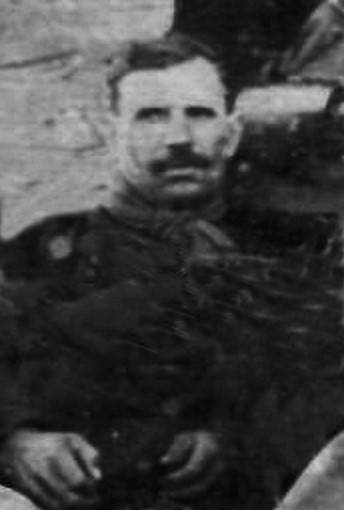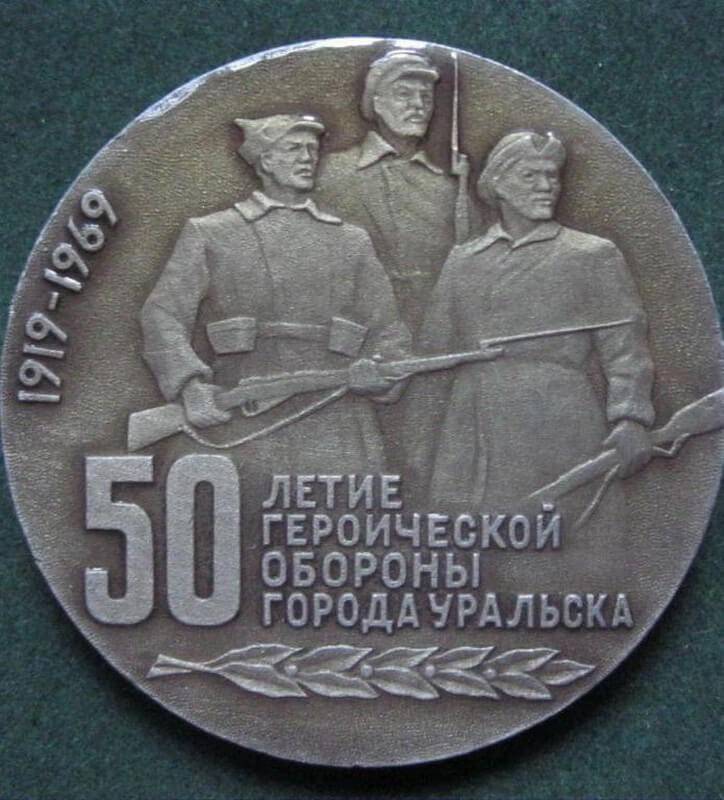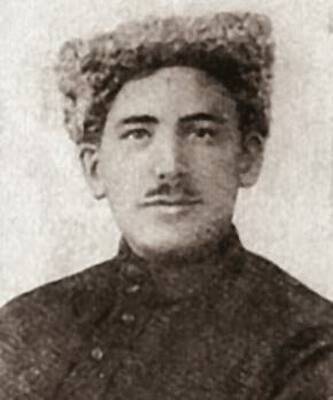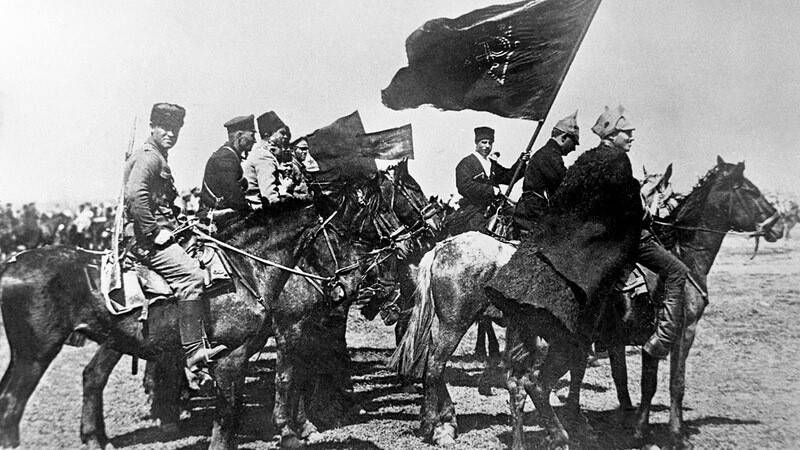Sapozhkov's uprising: how Chapaev's ally opposed the Bolsheviks

Alexander Sapozhkov
During the years of the Civil War, major uprisings against the Bolsheviks occurred not only among the peasants, but sometimes among the regular units of the Red Army. And this is not surprising, given that the majority of the Red Army soldiers of that period are the same immigrants from the peasantry, like the Tambov, Siberian or Yekaterinoslav rebels. Many red commanders also came from peasants, who also managed to gain rich combat experience on the fields of the First World War.
One of these uprisings took place in the Samara province under the leadership of the red commander Alexander Sapozhkov. Explaining to the people the goals of the uprising that had begun, Sapozhkov wrote in one of his first appeals:
About three thousand people took part in the uprising - about the same as in the Decembrist uprising in St. Petersburg. However, almost every schoolchild today knows about the Decembrists, tons of literature have been written about them, dozens of films have been shot, but only specialized specialists know about Sapozhkov’s uprising, there are few scientific works on the topic, and there are no fiction books or films at all.
And this despite the fact that Sapozhkov’s troops showed greater efficiency than the Decembrists: they were defeated in a few hours, while Sapozhkov’s Bolsheviks, having a multiple numerical advantage, could not defeat his associates for two months, and then another two years.
We will tell you about what did not suit the actions of the authorities and the command of the red division commander, how the uprising went and how it ended.
Red divisional commander and associate of Chapaev
The commander of the 9th Cavalry Division Alexander Vasilievich Sapozhkov came from the peasants of the Samara province. During the First World War, he fought at the front, rose to the rank of second lieutenant, and in 1917 returned to his native Novouzensky district, where he actively participated in revolutionary events. In fact, it was thanks to Sapozhkov that the power of the Bolsheviks was established in the district.
In May 1918, Sapozhkov became a member of the Samara provincial committee. At the same time, he assembled a detachment of local peasants, which soon became a brigade as part of the 4th Army of the Eastern Front. In the neighboring Nikolaevsky district, the same brigade was assembled by Sapozhkov's acquaintance Vasily Chapaev, and it also became part of the same 4th Army.
The brigades of Sapozhkov and Chapaev fought with the Cossacks and the people's army of Komuch, then with the troops of Kolchak. In January 1919, in the 22nd division, which included Sapozhkov's brigade, there was a mutiny of several regiments, during which many commanders and commissars were killed. After that, the former division commander Dementiev was removed from his post, and Sapozhkov took his place.
As commander of the 22nd division, Sapozhkov withstood an 1919-day siege in Uralsk in April-July 80. The city was completely surrounded by the White Cossack army of General Tolstov, but despite this, Sapozhkov continued to resist. In those days, he even received a telegram from Lenin, in which he said that if Uralsk held out, then the republic would not forget him, Sapozhkov. Uralsk survived, in July the 25th division of Chapaev arrived to help and lifted the siege.

Medal in honor of the 50th anniversary of the defense of Uralsk
Later, Sapozhkov's division was transferred to the Southern Front. However, soon, for reasons unclear to the end, its commander was removed from his post and sent back to the Samara province to form new units. The official dry wording was that the removal from office was "for inept command and for a corrupt policy." Under the "corrupting policy", most likely, they meant agitation in the division against the surplus appraisal and for free trade, which went against the dogmas of the Bolshevik ideology.
Arriving in his native land, Sapozhkov did not calm down and tried on the ground to stop the forced surplus appropriation and allow free trade, but to no avail. Seeing this, the command again transferred him from Novouzensky to Buzuluksky district, but he has not yet been removed from the post of commander of the emerging 9th cavalry division.
The new division was formed partly from Red Cossacks who had gone over to the side, and partly from Chapaev's recent associates from the 25th division. For all command positions, Sapozhkov placed people loyal to him who were with him during the defense of Uralsk.
And then one day something happened that Sapozhkov was most afraid of: on July 4, 1920, an order came to remove him from the post of division commander. This time without a new appointment.
The beginning of the uprising
Upon learning of his displacement, Sapozhkov first tried to negotiate with the commander of the Zavolzhsky military district, Konstantin Avksentevsky, but in vain. Then he decided to use force.
On July 13, in the village of Pogromnoye, not far from Buzuluk, Sapozhkov gathered the commanders of his division, explained the current situation to them, after which it was decided to start an uprising. The next day, at a rally, this was announced to the rank and file of the division. Sapozhkov renamed his division into the 1st Red Army of Pravda. The rebels stormed Buzuluk and took it in just an hour. The support of the local population played an important role in this. A. Bulyshev, an employee of the Samara Gubchek, reported:
The ultimate goal of the rebels is to conquer the province of Samara up to the Volga.
It is also important that during the Sapozhkov uprising, the slogan "Soviets without communists" was first put forward. It immediately gained popularity far beyond the Volga region, and in the following months was used by the rebels in many other regions.
In the taken Buzuluk, Sapozhkov released most of the prisoners (except for those who were imprisoned under especially serious articles) and announced mobilization into his army. There were no executions in the city, some of the captured Soviet workers and Red Army soldiers voluntarily went over to the side of the rebels. Those who refused were thrown into prison.
There are records of Sapozhkov's conversations with arrested Soviet workers. In them, the divisional commander noted that military experts were enslaving the army, Soviet officials had become bourgeois, lived in privileged conditions, and their wives wore diamonds. On the foreign policy of the Bolsheviks, Sapozhkov said that it had become predatory in relation to Poland, with which peace should have been negotiated.
But most of all, the divisional commander criticized the food policy of the Bolsheviks: the surplus appropriation is accompanied by unthinkable violence, local communists commit crimes, while reporting to their superiors about their successes.
The Bolshevik local authorities learned about the beginning of the uprising on its very first day. Already on the evening of July 14, the Samara Provincial Executive Committee sent a detachment against Sapozhkov, another detachment was sent by the Orenburg Provincial Committee. In total, more than 14 thousand infantry and cavalry with 89 machine guns and 46 guns were sent against the rebels in the following days. These forces were led by Avksentievskiy. At the same time, there were several times fewer rebels themselves and those who joined them.

K. Avksentievskiy
On July 16, troops loyal to the Bolsheviks took Buzuluk. Sapozhkov retreated to the southwest, his division did not lose its combat capability and continued to be replenished at the expense of local peasants. In addition to the peasants, deserters from the Red Army and the Ural Cossacks also joined it.
Local authorities reported to the center:
Despite the fact that there were five times more troops sent against Sapozhkov than the rebels, and 11 times more in terms of machine guns and artillery, they could not beat him for a long time. In his reports to his superiors, Avksentievskii explained this by the fact that Sapozhkov mainly had cavalry, which his foot soldiers simply could not keep up with. However, the support of the local population also played a significant role here, thanks to which Sapozhkov always knew where the large detachments of the Bolsheviks were.

Cavalry detachment of the Red Army
The end of the uprising
On July 28, Trotsky telegraphed to Avksentievskii:
If you consider it useful, go yourself to the area of liquidation of the rebellion. The dissemination of proclamations by planes in the region of the uprising is useful. In these appeals you could say that you have received an order to shoot any insurgent captured from weapons in hand".
Avksentevsky instructed the suppression of the uprising to his subordinates, and at that time he indulged in drunkenness. Later, it was for alcoholism that he would be removed from all positions.
In early August, Sapozhkov divided the detachment into two parts. The first was sent to storm Uralsk, the second was led by himself and tried to take his native city of Novouzensk. He stormed it twice, but to no avail, since the garrison of the city was significantly reinforced after the start of the uprising. Uralsk also repulsed all the assaults, however, during the siege, several hundred Red Army soldiers from the garrison went over to the side of the rebels.
It is worth saying that during the confrontation, the rank and file of both sides quite often went over to the side of the enemy, and when he was defeated in the next battle, they could go back.
In one of the battles on August 8, Sapozhkov's wife Daria, who had followed her husband since the beginning of the uprising, was captured. At first, the Bolsheviks wanted to shoot her, but then they decided to spare her, because if one of the Red commanders was captured, she could be used for exchange. Whether Daria was eventually left alive or not is unknown, the sources do not report anything more about her.
Sapozhkov himself, without taking either Novouzensk or Uralsk, retreated with fighting to the south, in the steppe of the Astrakhan province. On September 6, in one of the battles, he died, participating in the attack in the forefront of his now small detachment.
The remnants of his army, divided into small detachments, fled in different directions. Some of his associates were eventually captured and shot, while others continued to fight for a long time.
So, Sapozhkov's colleague Vasily Serov first disappeared, and in April 1921 raised a new uprising and fought the Bolsheviks until August 1922, until his detachment was defeated.
Information